Is Being Spiritual a Bad Thing: No!
Being spiritual is generally not considered a bad thing; it can offer numerous benefits such as inner peace, a sense of purpose, and a connection to something larger than oneself.
Spirituality can take many forms and can be an integral part of someone’s well-being, fostering compassion, gratitude, and personal growth.
Spirituality is often about seeking a deeper meaning in life, understanding one’s place in the universe, and connecting with a higher power or the essence of humanity.
It’s not necessarily tied to organized religion and can be practiced in various ways, like meditation, nature appreciation, or philosophical inquiry.
People pursue spirituality for different reasons:
Spirituality can sometimes be misunderstood or misrepresented as being unscientific or escapist. However, when approached in a balanced manner, it complements rational thought and can contribute to overall mental health and emotional well-being.
Spirituality enriches lives by providing depth, meaning, and a framework for understanding the complexities of existence, transcending the purely material aspects of life.
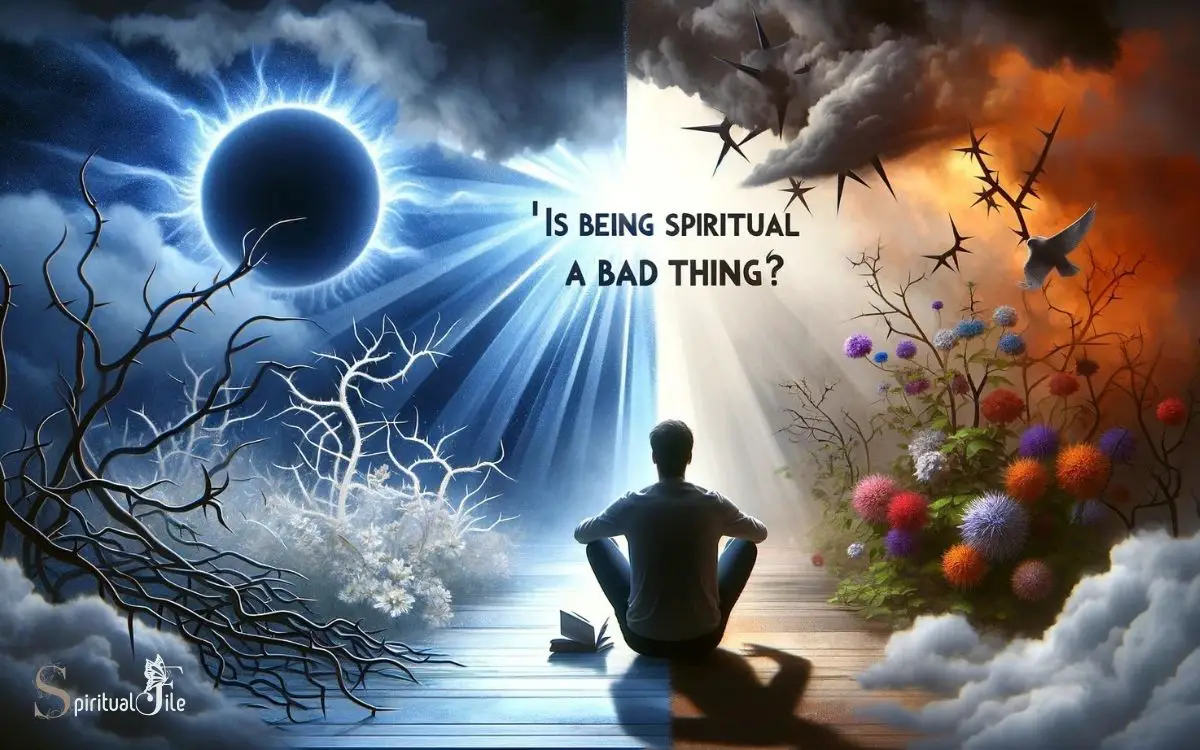
Key Takeaway
The Definition of Spirituality
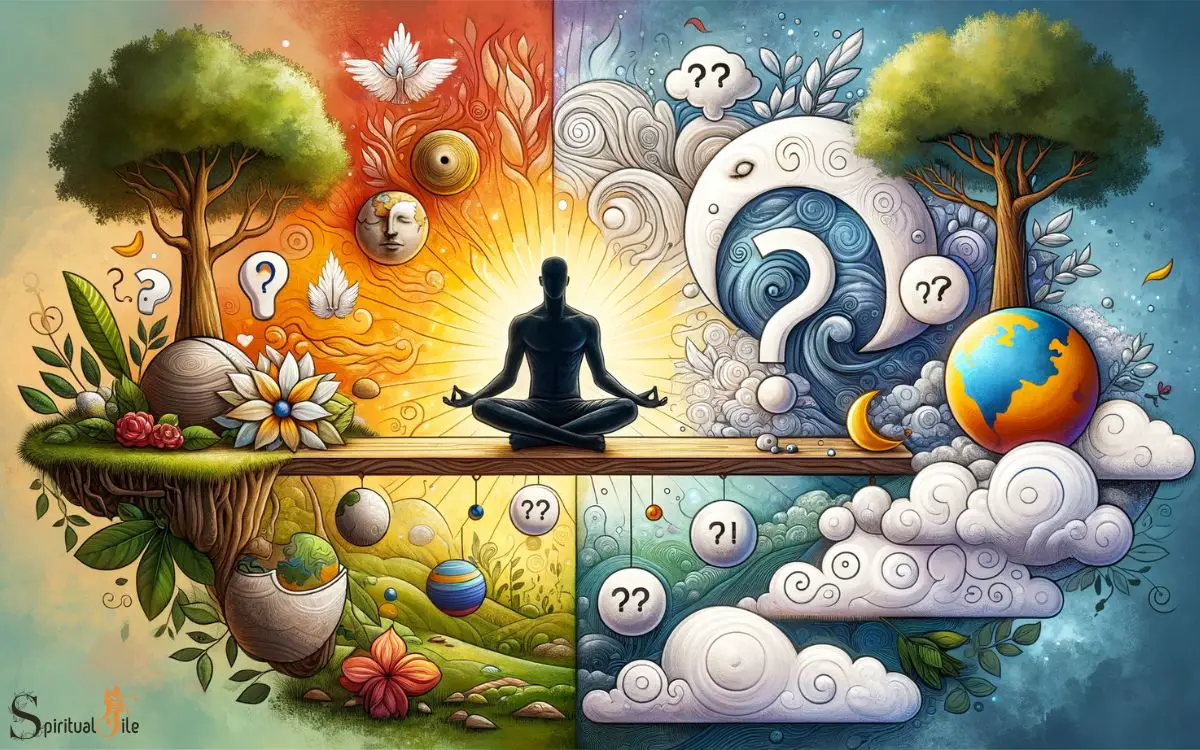
I often find that defining spirituality can be a complex and deeply personal endeavor. For me, spirituality encompasses a sense of connection to something greater than myself, whether that be nature, the universe, or a higher power.
It’s about seeking meaning and purpose in life, and striving to live in a way that reflects my values and beliefs.
Spirituality isn’t confined to religious practices; it’s a journey of self-discovery, inner peace, and compassion for others. It involves mindfulness, gratitude, and a deep appreciation for the beauty of the world around me.
Embracing spirituality has provided me with a sense of grounding and has been a source of strength during challenging times.
It’s a deeply personal and evolving aspect of my life that brings me a sense of fulfillment and understanding.
Criticisms of Spiritual Practices
Critics often raise concerns about the potential harm of certain spiritual practices. Some criticisms stem from the fear of individuals being manipulated or exploited by leaders within spiritual communities.
Others worry about the psychological effects of practices like meditation or intense emotional experiences during spiritual gatherings.
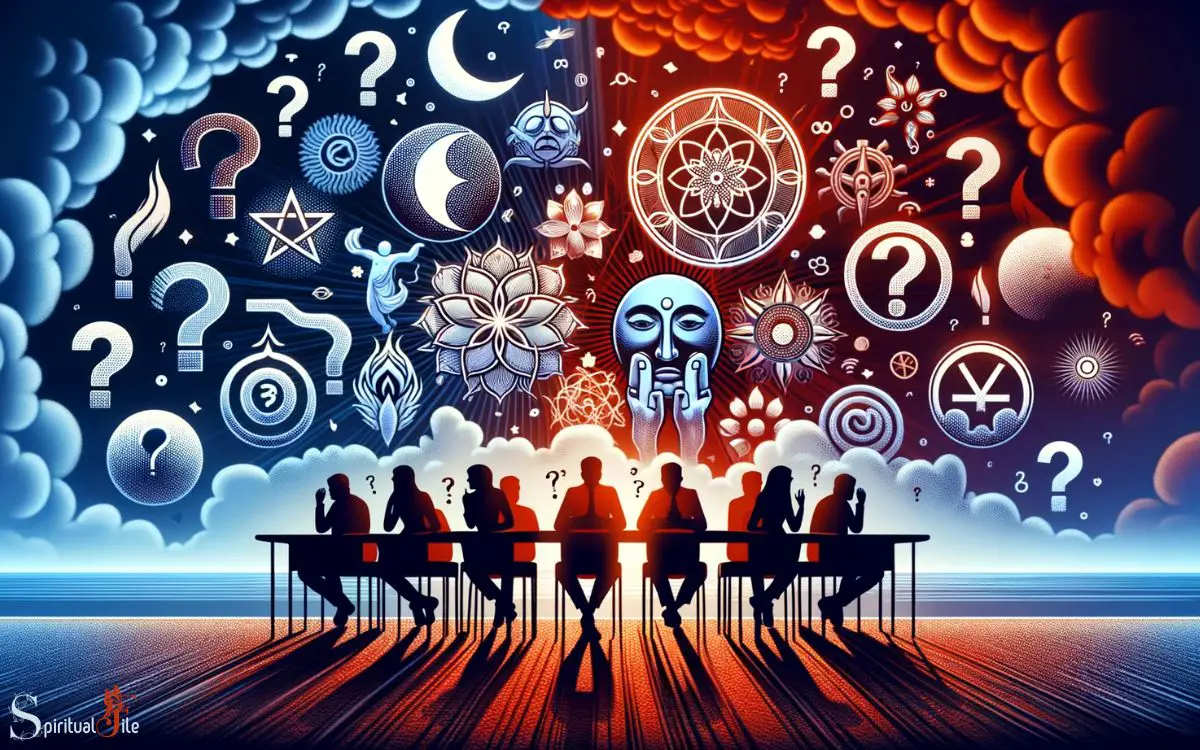
Here are some common criticisms of spiritual practices:
| Criticism | Explanation | Counterargument |
|---|---|---|
| Cult-like behavior | Some spiritual groups may exhibit cult-like behavior, leading to control and manipulation of members. | Not all spiritual communities exhibit cult-like behavior. Many provide a supportive and nurturing environment. |
| Psychological risks | Critics argue that intense spiritual experiences can lead to psychological distress or instability. | Many individuals report positive psychological benefits from spiritual practices, such as increased resilience and improved mental well-being. |
| Lack of scientific evidence | Some critics claim that spiritual practices lack empirical evidence to support their efficacy. | While more research is needed, there is growing evidence supporting the benefits of practices like meditation and mindfulness. |
Impact on Mental Health
Concerns about the potential harm of certain spiritual practices often extend to their impact on mental health.
As someone who values mental well-being, it’s essential to consider how spirituality can affect our mental health.
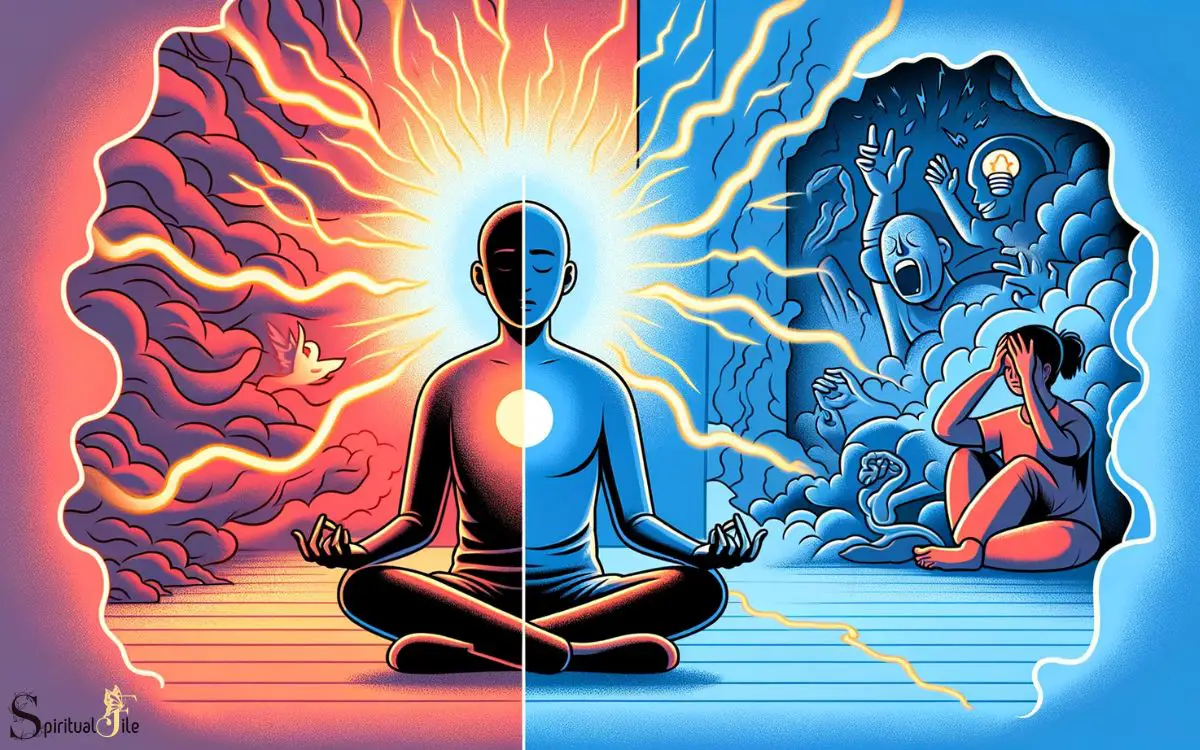
Here are some important points to consider:
- Stress and Anxiety: Some spiritual practices may inadvertently lead to increased stress and anxiety, especially if they involve rigid rules or expectations.
- Social Support: On the flip side, spirituality can provide a sense of community and social support, which is beneficial for mental health.
- Coping Mechanisms: Spirituality can offer individuals coping mechanisms, such as meditation and mindfulness, that have been shown to improve mental well-being.
- Potential for Harm: While many find solace in spirituality, there is also the potential for harmful ideologies to negatively impact mental health.
Spiritual Fulfillment Vs. Reality
One important aspect to consider when exploring spirituality is the balance between spiritual fulfillment and the practical realities of everyday life. It’s crucial to find harmony between seeking spiritual growth and meeting the demands of the real world.
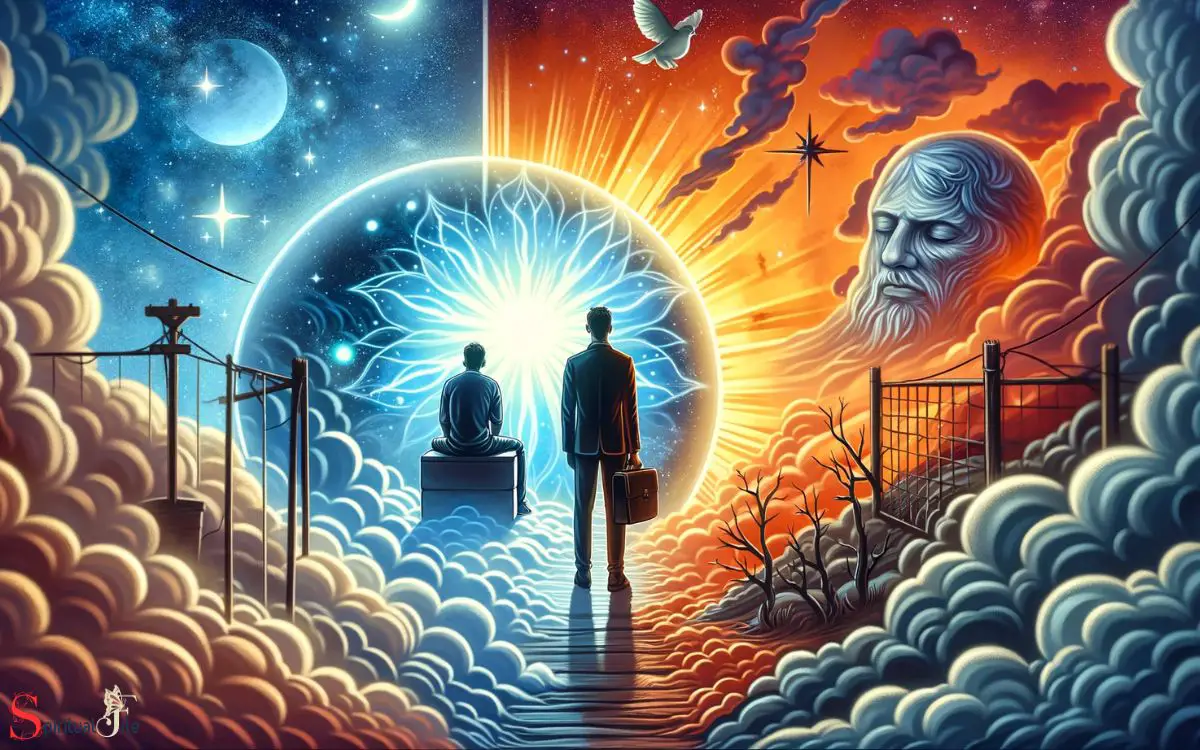
Here’s a breakdown of how these two aspects can be compared:
| Spiritual Fulfillment | Reality | Finding Balance |
|---|---|---|
| Provides a sense of purpose and meaning | Involves daily responsibilities and obligations | Integrating spiritual practices into daily routines |
| Offers a sense of peace and contentment | Includes financial, career, and family obligations | Setting aside time for spiritual reflection and mindfulness |
| Encourages personal growth and self-awareness | Demands adaptation to societal norms and expectations | Aligning personal values with societal responsibilities |
Balancing spiritual fulfillment with reality involves integrating spiritual practices into daily routines, setting aside time for spiritual reflection, and aligning personal values with societal responsibilities.
Balancing Spirituality and Rationality
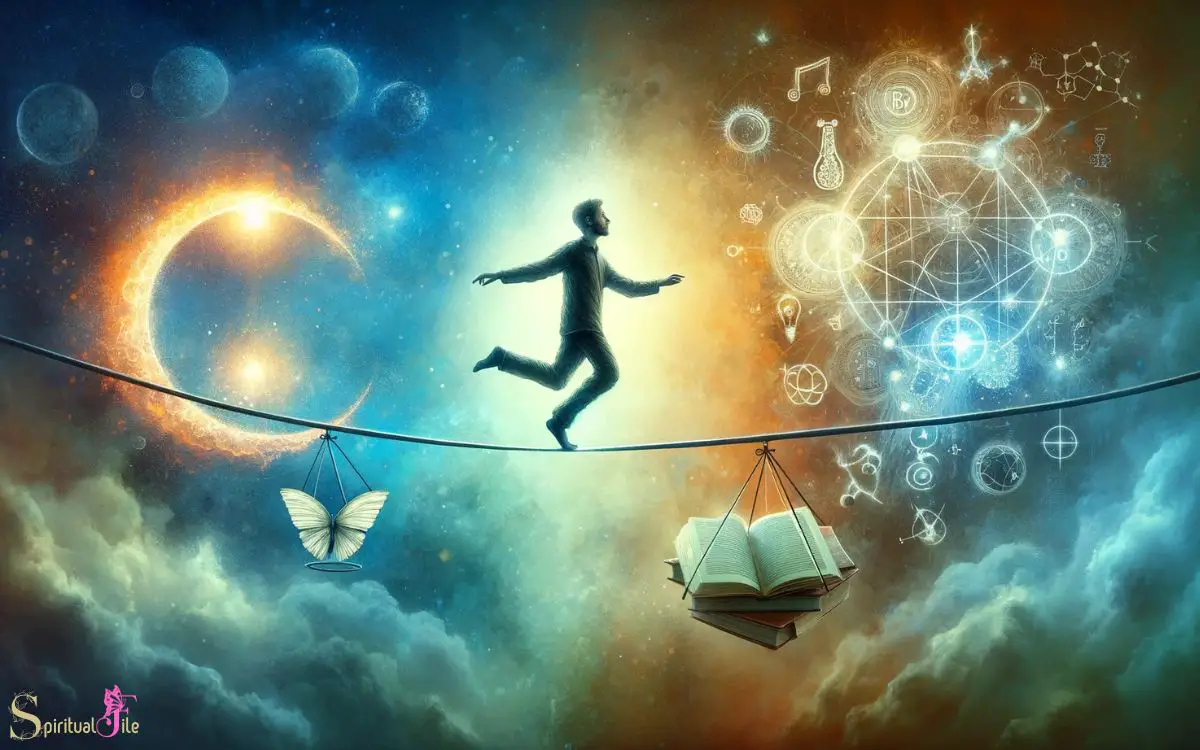
Balancing spirituality and rationality is essential for navigating the complexities of modern life.
- Acknowledge emotions: Embracing spirituality allows me to connect with my emotions and understand their impact on my decisions.
- Critical thinking: Rationality enables me to approach situations with logic and reason, keeping me grounded in reality.
- Finding harmony: Integrating spiritual practices, such as mindfulness or meditation, with rational decision-making creates a sense of balance in my life.
- Flexibility: Being open to spiritual experiences while also maintaining a rational mindset allows me to adapt to various challenges.
By recognizing the value of both spirituality and rationality, I can cultivate a more holistic approach to life, finding meaning and fulfillment while also engaging with the practicalities of the world.
Is there a connection between spirituality and mental health?
Many studies have explored the connection between depression and spirituality. Research suggests that people who have a strong spiritual practice tend to have better mental health outcomes. Engaging in spiritual activities such as meditation, prayer, and mindfulness can help individuals cope with symptoms of depression and anxiety. Understanding the link between depression and spirituality explained is crucial for holistic mental health care.
Navigating the Stigma of Spirituality
I’ve often encountered misconceptions about spirituality that have made me hesitant to openly embrace my personal journey.
However, I’ve learned the importance of overcoming societal stigmas and embracing my beliefs wholeheartedly.
Finding a supportive community has been crucial in navigating the challenges of being spiritual in a world where it’s often misunderstood.
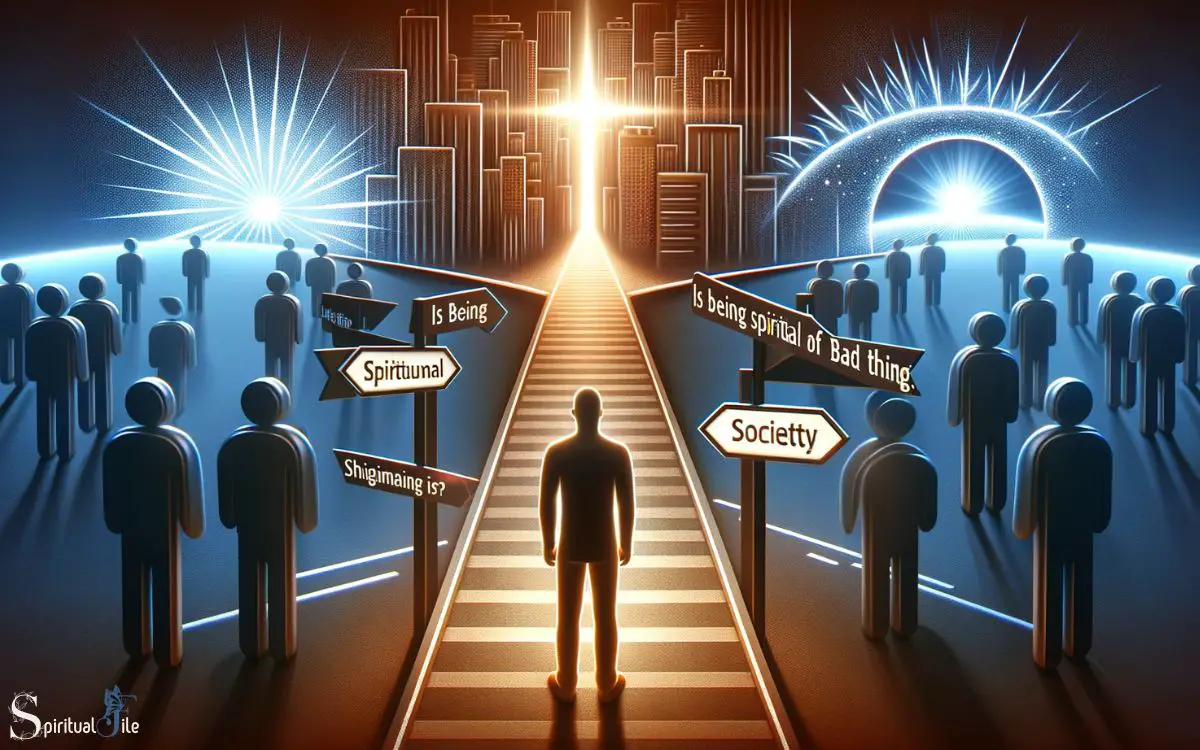
Overcoming Societal Misconceptions
Despite societal misconceptions about spirituality, I have found that navigating the stigma has been a transformative journey.
It’s been challenging, but ultimately rewarding. Here are some key insights I’ve gained along the way:
- Open-mindedness: Embracing spirituality doesn’t mean rejecting science or reason. It’s about finding harmony between different aspects of life.
- Individuality: Spirituality is a deeply personal journey. It’s not about conforming to a specific set of beliefs, but rather about finding what resonates with your own experiences and values.
- Compassion: Being spiritual doesn’t make someone naive or gullible. It can actually cultivate empathy and understanding for others.
- Growth: Embracing spirituality has allowed me to explore new perspectives and grow as a person. It has enriched my life in ways I never expected.
Embracing Personal Spiritual Journey
Navigating the stigma of spirituality has been a challenging yet enlightening journey. As I’ve embraced my personal spiritual path, I’ve encountered skepticism and misunderstanding.
It’s been a process of self-discovery and learning to navigate the societal misconceptions surrounding spirituality.
I’ve found that embracing my personal spiritual journey has allowed me to connect with my inner self, find peace, and cultivate a sense of purpose.
It’s crucial to acknowledge that spirituality is a deeply personal experience, and each individual’s journey is unique.
While there may be stigma attached to it, I’ve learned to value and honor my spiritual beliefs. Embracing my spirituality has empowered me to live authentically and find meaning in life. This journey has taught me resilience and the importance of seeking genuine understanding.
As I’ve navigated the challenges of embracing my personal spiritual journey, I’ve come to realize the significance of finding community and support.
Finding Community and Support
Finding community and support while navigating the stigma of spirituality has been essential to my personal growth and well-being.
It’s not always easy to embrace spiritual beliefs in a world where they are often misunderstood or stigmatized.
However, I’ve found that connecting with like-minded individuals has made a significant difference in my journey.
Here are four key reasons why finding community and support has been crucial for me:
- Validation: Being part of a community that shares similar beliefs helps validate my spiritual experiences and feelings, reducing the sense of isolation.
- Understanding: Engaging with others who have navigated similar challenges provides a deeper understanding and empathy, fostering a sense of belonging.
- Learning: Community support offers opportunities for learning and growth, expanding my knowledge and perspective on spirituality.
- Resilience: Having a supportive network has strengthened my resilience, enabling me to better navigate the stigma and challenges associated with spirituality.
Conclusion
In the end, being spiritual is like walking a tightrope between heaven and earth. It’s a delicate balance of finding inner peace while staying grounded in reality.
Despite the criticisms and stigma, the journey of spirituality is like a beautiful dance between the tangible and the intangible, creating a harmony that brings joy and meaning to life.
So, embrace the spiritual path and let your soul soar while keeping your feet firmly planted on the ground.






